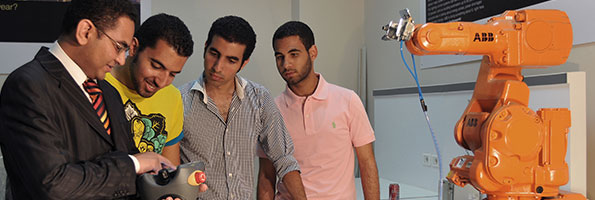
Mechanical Engineering is as vital in the 21st century as it was in the 17th century (The stage of the industrial revolution and the development of machines to replace labor work). This is simply because energy and mobility are still and will continue to be the lifeblood of our human society and economy.
Mechanical Engineering (ME) can be defined as the branch of engineering that serves society through the analysis, design and manufacture of systems at all size-scales that combine energy, materials, and information to produce useful mechanical work. Mechanical engineers design, build, and test a wide variety of products and processes that range from your car and its engine, the refrigerator in your kitchen, the hydro and gas turbine that provide your house with electricity, to the space shuttle.
Because the industries in which mechanical engineers work are so varied, you can expect that your education and training to become a mechanical engineer is also very broad. Mechanical engineering is also becoming more and more intertwined with computer and electrical engineering as in the areas of mechatronics and robotics. Mechanical engineering is a broad, but very promising field for those who are considering what kind of career they want to choose.
In our ME curriculum, basic sciences and engineering fundamentals represent a solid foundation which are not only a must for studying and understanding the different engineering disciplines, but it is also needed to help the graduate for solving the new related problems arising in the future. Nontechnical subjects are given the enough importance in order to enable the graduates to work in teams and project management, communicate effectively, and respect the engineering ethics. Well balance between theoretical education and practice (Laboratory experiments, project based learning courses, and industrial training) is carefully considered in designing our ME curriculum.
What can Mechanical Eengineers do?
-
Design (products, machines and systems): machines, equipment, engines, oil well drilling and extraction equipment; piping systems and pressure vessels – reactors; material handling equipment - conveyers, robots, production lines; vehicles – cars, heavy equipment, buses, aircraft, ships. Energy conversion methods – fuel cells, wind power, hydroelectric, nuclear, geothermal, wind power, solar.
-
Analysis: equipment failures to improve performance and reliability; heat transfer, vibration, sound.
-
Fabrication: coordinate fabrication of equipment; develop and improve fabrication techniques and methods
-
Testing: quality, performance, saengineeringy, and reliability of products, equipment, processes
-
Research and development
-
Operations and maintenance: keep various plants and processes operating at optimum performance, operations supervision and management
Where can graduates work?
-
Conventional industries
-
Automated industries
-
Aerospace and defense sectors
-
Automobile modern car maintenance centers with equipment of advanced technology.
-
Industrial research and development groups
What are the Mechanical Engineering disciplines within the University?
-
Mechatronics program: Today up to date technology concerned with computer controlled electro-mechanical systems and products with embedded electronics, sensors, and actuators.
-
Production and manufacturing (In process for approval).
-
Mechanical power (In process for approval)
For the time being, only the Mechatronics program is working.
Why should one be a Mechanical Engineer?
-
You get the opportunity to create something tangible and useful. Your creations will be used by others. It gives you the greatest joy
-
It is the broadest branch of engineering…so your career options are open
-
Learning different varieties: You learn how to design and make things ranging from a saengineeringy pin to a spacecraft
-
Easy to imagine and visualize whatever you learn
-
Develop a range of skills – you learn the work of a machine operator, a mechanic, a plant manager, a researcher, and a policy maker
-
You work with anything, from massive machines (majestic in nature) to tiny precision instruments, micro, and nano devices.
-
Importance of your work: You form the human resources that are required for the survival of any industry and form the backbone of modern human life. You are the person who may generate power/energy from natural resources; make equipment, and design processes; make cars, planes, ships; make machines that manufacture products ranging from food to surgical instruments to weapons and manage factories and businesses.
